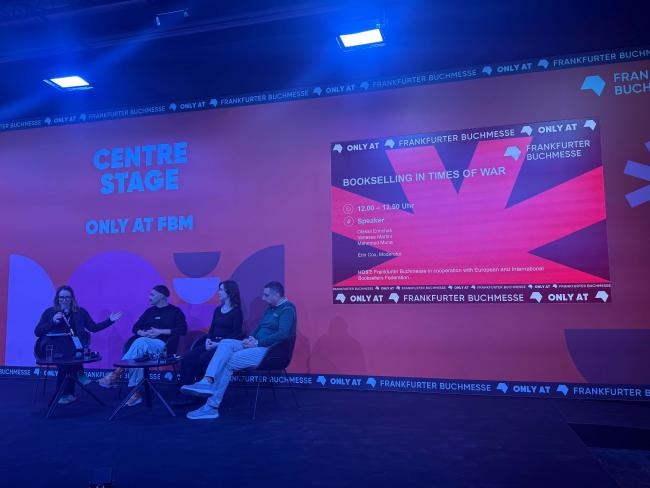
Another year, another Frankfurter Buchmesse! Now that the 77th edition of the Frankfurt Book Fair is behind us, let’s cast an eye back to EIBF’s activities across the fair – marked by EIBF’s participation in the organisation of the Bookselling in Times of War panel, part of the fair’s Frankfurt Calling programme.
EIBF’s programme this year was a bit different: instead of attending panels and events, it prioritised one-on-one meetings with members and significant stakeholders across the industry.
However, this year EIBF also had the opportunity to co-organise, along with the Fair’s Frankfurt Calling programme, the Bookselling in Times of War panel, aimed at spotlighting booksellers and they ways in which they sustain their work when polarization, censorship, or even full-scale war threatens them and the communities they serve.
The conversation, moderated by Erin Cox (publisher at Publishing Perspectives) brought together booksellers from Kyiv (Oleksii Erinchak, Сенс), Jerusalem (Mahmoud Muna, Educational Bookshop), and San Francisco (Vanessa Martini, Green Apple Books) and explored how they protect stories, nurture readers, and keep cultural spaces alive amid different kinds of pressure. Each participant shared their own experience, from everyday challenges to inventive forms of resilience, offering a look at bookshops as anchors of dialogue, memory, and hope.
Oleksii highlighted the transformation of his bookshop from a ‘simple’ business into a crucial community hub and cultural space. Opened in January 2022 (one month before Russia’s full-scale invasion of Ukraine), Сенс had to quickly adapt and evolve into a role that was not initially envisioned. Indeed, with the start of the military aggression, it evolved into a hub where civilians and military personnel could find refuge: a safe haven amid chaos and uncertainty. Beyond its protective role, the shop also became a beacon of Ukrainian cultural preservation through literature and acting as a site of resistance and identity safeguarding. It saw a decisive shift in consumer preferences as well, reflecting its newfound role as a vanguard for cultural protection and self-affirmation: before the invasion, 80% of books sold were in the Russian language, now obviously no longer the case, with Ukrainian-language books emerging as the preference (or better, as the necessity). Interestingly, this newfound purpose and mission still had to face the reality of the book market: how do you compete with phenomena like BookTok, which provide a much higher level of commercial profit and sustainability, with ethical imperatives such as raising political awareness on current contemporary issues?
Similarly, Mahmoud described how The Educational Bookshop in Jerusalem goes far beyond ‘just’ selling books: it promotes critical thought and dialogue in an environment often marred by political tension and oppression. Initially focused on Arabic-language works, the shop expanded to include English, Italian, and Spanish titles to reach broader audiences. Mahmoud argued that when political systems fail, bookshops shoulder a moral responsibility to keep discourse alive as booksellers ‘’are in the business of promoting ideas’’. For Mahmoud, the concept of ‘political’ varies across contexts: in oppressed societies, neutrality is impossible because everything is political – starting with your very own existence. This places an even greater importance on the role of booksellers as promoters of diverse thought, an alternative to the status-quo imposed from above. As eloquently put by Mahmoud, ‘’bookshops need booksellers, not a till’’.
Moving along across the pond, Vanessa reflected on the unique challenges faced by U.S. bookshops, especially amid increasing book bans and restrictions in schools. She pointed out that while institutions of formal education and knowledge inquiry face censorship and funding cuts, independent bookstores, like Green Apple Books, can sustain intellectual freedom because they are not reliant on federal funding and support and thus find themselves in a unique position to continue, steadfast in their mission, without legal hinderances or conditionalities. Vanessa also stressed the power of booksellers as curators, reminding peers of the significance of seemingly small acts in shaping cultural and intellectual spaces.
The discussion among these formidable booksellers crystallised one irrefutable truth: bookselling is far more than a commercial act: it is an act of political courage, cultural resistance, and civil defiance. Bookshops stand as sanctuaries for peace, democracy, and tolerance, even under threat. Supporting them politically and economically is not optional; it is imperative for the health of our communities. It is also imperative that we continue to carve out spaces for booksellers to tell their stories and be an active participant in societal discourse – exactly what was possible thanks to the stage at the Frankfurter Buchmesse 2025.
